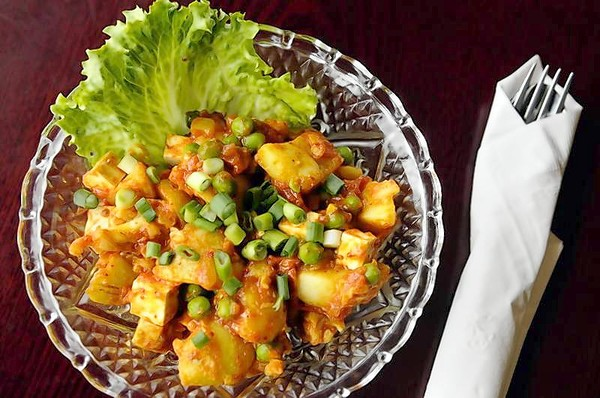
Himalayan Ne-zom, a spicy medley of tofu, peas, and cauliflower with seasoned potato tossed in homemade tomato sauce, is one of the appetizers at Tibetan Kitchen. [Photo/cpoisson@courant.com]
With a blend of authentic Tibetan food and improvised fusion items of Chinese cuisine, the "Tibet Kitchen" Restaurant pleases customers from northeastern America.
It is co-owned by typical Tibetan Tsering Yangzom and Sherab Gyaltsen from Nov. 2011 in Middletown, Connecticut, one of the six states of northeastern state of New England, US.
Gyaltsen describes Tibetan Kitchen's fare as a blend of authentic Tibetan food and other improvised "fusion" items, some even reflecting Chinese flavors and preparations.
"It's whatever I used to cook at home," says Yangzom. "I didn't go to cooking school; these are my own recipes."
Among the most traditional Tibetan dishes on the menu: thukpa, a noodle soup with sautéed green vegetables and a choice of beef, chicken or pork; shaptak, spicy sliced beef sautéed with onions and peppers and served with tingmo (steamed bread); and phing-sha, potato, beef, bean thread noodle and spinach in a tangy sauce.
Diners familiar with Tibetan food may be looking for yak meat, but it isn't on the menu here. Yangzom says it's difficult and expensive to obtain, and they're trying to keep the dishes at a certain price point.
Tibetan Kitchen also serves plenty of vegetarian dishes, with tofu, potato and green vegetables as star ingredients for non-carnivores, "The thing about Tibetan food, we feel that it's healthier," Gyaltsen says, noting that it doesn't use as much spice as Indian cuisine nor the amount of oil (or deep-fried items) as Chinese cuisine. Both owners said their customers have been pleased with the variety of vegetarian options.
Yangzom and Gyaltsen spent two months renovating the 20-seat space and decorating it with traditional touches, including maroon walls (the color of Tibetan monks' robes, Gyaltsen explains) and a "double dorje" hanging at the entrance. Yangzom described this as a cultural symbol, a "cross-thunderbolt" that can destroy any evil and is itself indestructible.
Movie posters and other Tibetan-centric documentaries hang on the walls, creating a more modern feel–so that "our customers don't feel like they're eating in a monestary," Gyaltsen says, laughing.
Masselli, who extols the "warmth, flavor and texture" of Tibetan Kitchen's food, says Middletown is an ideal spot for the restaurant.
